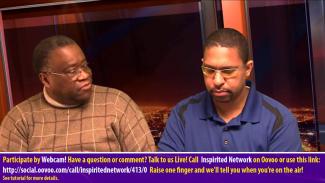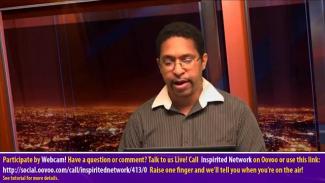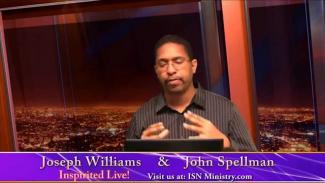What does Proverbs teach about relationships? How should people deal with conflicts with one another? How do words play a role in conflicts? If friends are to love one another, what does that love look like and how should it be demonstrated? What value should be placed on money in our personal relationships? This week, in Proverbs 17-19, Solomon explores conflicts and gives sound wisdom that can greatly impact how we get along with one another.
Inspirited Live
Choose from all Inspirited Live programming or select a topic from the menu.As human beings we often look only at the surface value of things and fail to see what is beyond. Much like how the crew of a ship sees the tip of an iceberg, people may think the wicked prosper but don't know the full story. How does Solomon again compare the foolish and the wise? In what ways do people today display these characteristics? When you get past the surface value, what are the rewards of the fool and the wise? What do each contribute to society? What other things does Solomon teach us in Proverbs 14 - 16?
What is the difference between when we obtain material wealth and obtain it with God's blessing? How does Proverbs contrast the experience of the righteous with that of the wicked? Can a person be intelligent or smart, but still be foolish and unwise? What are the rewards of doing the right thing? What should be our motivation to do right? How does God feel about hard work and laziness? How do our choices to do right or wrong impact people around us? In this week's lesson we explore how Proverbs illustrates the way in which we reap what we sow.
This week we focus on wisdom and its link to Creation. How is wisdom linked to creation? In what ways does wisdom's personification in Proverbs 8 connect with the characteristics of the Godhead? Also, in this chapter, Solomon again compares wisdom and foolishness highlighting their different approach at drawing people to their side. What makes wisdom the better option? What value should we place on wisdom? How do fools respond to wisdom?
This week we discuss Solomon's themes of law as it relates to light and life. How can God's law function as a light in our lives? What does it mean to have the law written on the heart? Does God really want us to tie commandments to our heads, hearts, necks, and hands? How should we interpret these passages of scripture? What does Solomon have to say about resisting temptation? In this study we explore Solomon's advice: including why one must resist the adulterous woman. What important lessons does Solomon focus on here and why are they so crucial?
In the book of Proverbs, Solomon often refers to the ears and the feet. What do these references mean? Why are the ears and feet so important? This week we explore Proverbs 4 - 6 looking at some of the wise counsels of Solomon on subjects such as obtaining wisdom, work, sexuality and family, friendship, avoiding the calamity of evil. Is Solomon's wisdom still valid today? In our post modern world, how might we apply this wisdom?
This week we begin studying the book of Proverbs written by Solomon. What is the meaning of these wise sayings? Why did Solomon write them? Where did Solomon get his wisdom from? Is wisdom something to work for, or is it something given and received? What is the greatest source of wisdom and how can people obtain it today? Is there a difference between worldly wisdom and heavenly wisdom? As we begin our study on the book of Proverbs we will look at Solomon's call to wisdom and tackle many of these questions.
This week Dr. Bertram Melbourne joins us as we tackle what James has to say about prayer. What is the relationship between prayer, healing, and restoration? Why is it some people are not seeing the answers to their prayers? Can miracle healing still take place in the church? What are some hindrances to our prayers and what role should praise play in our Christian experience?
What does James suggest in preparation for the Harvest? What does he mean by patience and endurance? How does this manifest itself in the way Christians relate to one another? Is the Lord delaying His coming? Why did James use the imagery of the former and latter rain? What might this imagery mean for Christians? This week we study James' views on the Second Coming of Jesus and its implications for Christian living today.
What does the book of James say about the rich? Does the Bible condemn riches? Does it favor the poor? How can we understand James' warning to the rich? What Biblical principles can we grasp that should influence the way Christian employers conduct and do business? James draws our attention to corruption and oppression as he warns of the judgment to come. God holds us accountable for the blessings He gives to us.
What is the difference between worldly and heavenly wisdom? What forms the basis for both? What is the end goal of all true wisdom? How does worldly wisdom impact the church? Is there a difference between knowledge, understanding, and wisdom? How do we know who is wise and who isn't? This week we explore the true meaning of wisdom in the book of James, and what this wisdom means for us today.
What does the book of James teach about how we use our mouths? James seems to suggest that though the mouth is a small part of our body, it has a great influence. What spiritual implications might this hold for Christian believers today? How do our words impact one another? Is it OK for Christians to use foul language, even when talking with those who use it frequently? How can we do better at using our speech in more meaningful and edifying ways? Why is it so important that we be mindful of the things we say?












